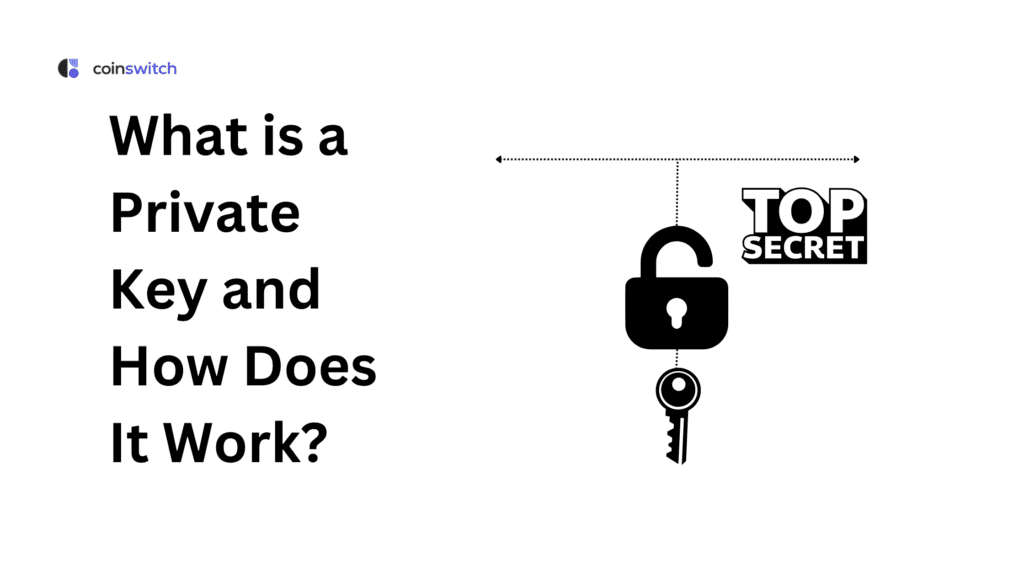What is a Private Key?
In the world of crypto, security is everything. And what lies at the heart of this is a unique piece of code called a private key. It acts like a digital signature or a secret password that gives you access to your crypto holdings. Without it, no one not even you can move or control the assets.
Defining the Basics: Private Key
A private key is an alphanumeric code generated by a crypto wallet. This key is paired with a public key to form the foundation of public-key cryptography. Think of it like a safe deposit box: the public key is the box number anyone can see, but the private key is the only way to unlock it.
How Does It Work?
The private key is used to authorize transactions, proving ownership of the crypto in question. When you initiate a transaction, your private key creates a digital signature that the network can verify using your public key. This ensures that the transaction is legitimate and authorized by the rightful owner.
Importantly, private keys never leave your wallet during the signing process, making them extremely secure—if handled properly.
Read More: What is BscScan and How Does it Work?
Why Is It Important?
Private keys are crucial because they are the only way to access and control your digital assets. If someone gains access to your private key, they gain full control of your crypto. Similarly, if you lose your private key, your crypto may be lost forever, and it cannot be recovered.
Storing Your Private Keys
Given its importance, storing your private key securely is critical. We have listed a few popular options below:
- Hardware Wallets: Physical devices that keep your private key offline
- Paper Wallets: A printed version of your private key, stored securely
- Software Wallets: Applications that manage your keys but are more vulnerable to hacking
- Custodial Wallets: Wallets where platforms like exchanges store your keys
Each method has trade-offs in terms of convenience and security.
Read More: Bitcoin CME Gaps: What They Are, and How to Trade Them
Types of Private Keys
- The cryptographic algorithm (RSA, ECDSA, Ed25519, etc.)
—–BEGIN RSA PRIVATE KEY—–
MIIBOgIBAAJBALu7F/Ej3oPvT0UBpTknw6ZzF3zZlM5g9X/Y9b/rc8UQ+X2rPByM
2oVQ1ZWr4OHb9YBR6sO0ajUvazCfqTGBX0ECAwEAAQJAWdb9kKImMnLox+pU3BBw
Msn92f/JY5eBfU8avW4cFHwzU1LryKZlSBtIYn8Tr+bOYZ2EDBgJMGijm8mJR6QA
IQIhAOv0mVQpmf7J1zQGL08pX2i2ndCuI6vXf3VxZrEwLMqBAiEAxU0q2x5g2RQm
jD8pR0+NltAZs1POvA1bbnBtlhfw6hECIQDqsJdDcIETm4bnPR0hdf13eOq38Ltt
6tfzofQAoH+M4QIhAJ6gJmfhfZ70Gyn3o7jbb3yKKhq/z91u6v6Hq7GXgKN1AiBz
ML7n5Rfcv4UmDUu6RynXLkZyUqQfVtSVROtLzseZtQ==
—–END RSA PRIVATE KEY—–
2. The encoding and container format (PEM, DER, PKCS#8, PKCS#1, OpenSSH, etc.)
—–BEGIN EC PRIVATE KEY—–
MHcCAQEEILJHCrbZn7Fo1JhK2ueGmGwv7WFTt3H2PTgEkFUw1XG6oAoGCCqGSM49
AwEHoUQDQgAE5MI6HLfgEluXj2HpxvVkS0+jZ0eR6x5VgfFW67Edr8Hz2R8sV78A
WUh2yH4dCS90kY0UBl2vH7b9qDZpCjeK7Q==
—–END EC PRIVATE KEY—–
Private Keys and Digital Wallets
Every crypto wallet uses private keys. When you create a wallet, it automatically generates a private-public key pair. Your wallet software uses the private key to sign transactions and prove ownership of funds. Importantly, many modern wallets hide the private key from you and instead provide a seed phrase—an easier way to back up and recover your keys.
FAQs
1. What exactly is a private key?
A private key is a unique, secret code that allows you to access and control your crypto. It is used to authorize transactions and prove ownership of a digital asset.
2. Is a private key a password?
Similar to a password. But a private key is more secure than a typical password and is mathematically tied to your crypto wallet.
3. How do I get a private key for crypto?
Your private key is generated by your wallet.
4. Where is a private key stored?
It can be stored in hardware wallets, paper backups, software apps, or by a custodial service.
5. What is the term for the confidential code that gives access to and control over a crypto wallet?
The term is “private key.”








